100个最容易拼错的单词
- 格式:doc
- 大小:52.50 KB
- 文档页数:7
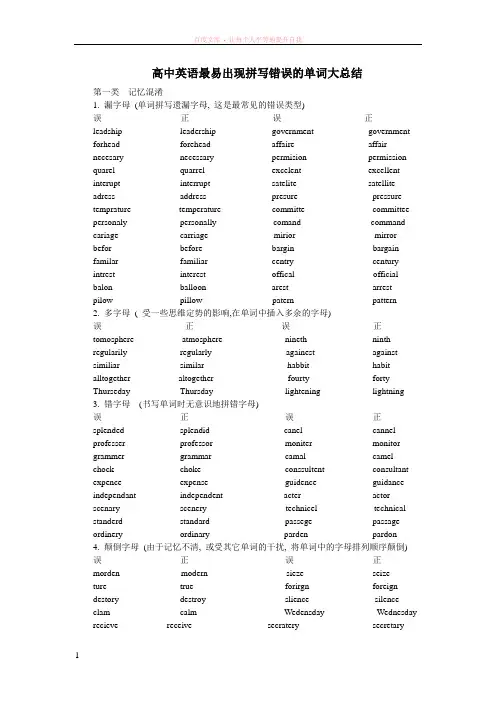
高中英语最易出现拼写错误的单词大总结第一类记忆混淆1. 漏字母(单词拼写遗漏字母, 这是最常见的错误类型)误正误正leadship leadership government government forhead forehead affaire affair necesary necessary permision permission quarel quarrel excelent excellent interupt interrupt satelite satellite adress address presure pressure temprature temperature committe committee personaly personally comand command cariage carriage mirior mirror befor before bargin bargain familar familiar centry century intrest interest offical official balon balloon arest arrest pilow pillow patern pattern2. 多字母( 受一些思维定势的影响,在单词中插入多余的字母)误正误正tomosphere atmosphere nineth ninth regularily regularly againest against similiar similar habbit habit alltogether altogether fourty forty Thurseday Thursday lightening lightning 3. 错字母(书写单词时无意识地拼错字母)误正误正splended splendid canel cannel professer professor moniter monitor grammer grammar camal camel chock choke conssultent consultant expence expense guidence guidance independant independent acter actor scenary scenery technicel technical standerd standard passege passage ordinery ordinary parden pardon4. 颠倒字母(由于记忆不清, 或受其它单词的干扰, 将单词中的字母排列顺序颠倒) 误正误正morden modern sieze seizeture true forirgn foreign destory destroy slience silence clam calm Wedensday Wednesday recieve receive secratery secretarytatol total cigeratte cigarette cheif chief bicsuit biscuit 5. 词义混淆(因部分单词意思相似或读音相似而产生相互干扰)A词B词A词B词access assess stick strict flesh fresh grasp gasplate lately wonder wander sign sigh effect affect adopt adapt through thorough medal metal chicken kitchen expect except quality quantity charge change course cause quite quiet battle bottle dairy diary angel angle sweet sweat contest context site sight champion campaign floor flour incident accident loose lose vocation vacation award reward wrist waist attract attack doubt double 6. 词性混淆( 记忆单词时没有注意单词的词性)动词名词名词形容词believe belief reality real weigh weight absence absent attract attraction width wide assist assistant length long protect protection height high recover recovery religion religious mix mixture nature natural explain explanation peace peaceful graduate graduation importance important exist existence humor humorous fail failure science scientific prove proof poverty poorsell sale difficulty difficult advise advice honesty honest lose loss noise noisy recover recovery hunger hungry discover discovery freedom free serve service difference different breathe breath danger dangerous safety safe第二类相互干扰1. 拼写干扰(受其他单词拼写的干扰, 想当然地认为这个单词也这样拼写)干扰词误正decide devide dividehigh hight heightsafety truely trulysixty/fourteen foruty fortybelieve recieve receiveelectricity univercity universityvillage collage collegeenemy enegy energyFrenchmen Germen GermansAmerican Canadan Canadianwritten writting writingcame welcame welcomesocial sociaty societytaught braught broughtanger angery angryextra extramely extremelycenter centrel centralvalue valueble valuable2. 发音干扰(没有注意一些单词的读音和拼写不一致的现象)误正stomack stomachbreakfirst breakfastprivite privateseperate separateoppozite oppositecolar collarbucher butchervoyige voyagehankerchief handkerchiefblankit blanketbery buryChrismas Christmaswistle whistlecampain campaignexibition exhibitionautum autumn第三类规则不熟悉1. 构词规则(对构词法缺乏了解, 没有注意一些特殊的拼写规则)误正simplely simplyusaly usuallyluckyly luckilyhappyness happinessangryly angrilyfishman fishermanwesten westernwestword westwardnoisey noisyarrivel arrivalfameous famoustwentith twentieth2. 语法规则(如在给动词加ing或ed, 或形容词, 副词加er, est时, 不注意双写重读闭音节末尾的辅音字母)误正studing studyingregreting regrettingbegining beginningswiming swimmingpermited permittedoccured occurredrefered referredbiten bittenriden riddenthrowed threwthner thinnerhotest hottesthapiest happiestphotoes photospotatos potatoesrooves roofsthiefs thieves。
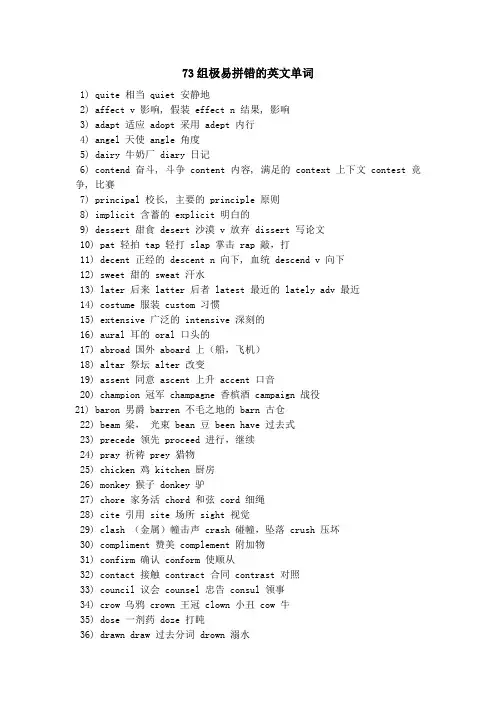
73组极易拼错的英文单词1) quite 相当 quiet 安静地2) affect v 影响, 假装 effect n 结果, 影响3) adapt 适应 adopt 采用 adept 内行4) angel 天使 angle 角度5) dairy 牛奶厂 diary 日记6) contend 奋斗, 斗争 content 内容, 满足的 context 上下文 contest 竞争, 比赛7) principal 校长, 主要的 principle 原则8) implicit 含蓄的 explicit 明白的9) dessert 甜食 desert 沙漠 v 放弃 dissert 写论文10) pat 轻拍 tap 轻打 slap 掌击 rap 敲,打11) decent 正经的 descent n 向下, 血统 descend v 向下12) sweet 甜的 sweat 汗水13) later 后来 latter 后者 latest 最近的 lately adv 最近14) costume 服装 custom 习惯15) extensive 广泛的 intensive 深刻的16) aural 耳的 oral 口头的17) abroad 国外 aboard 上(船,飞机)18) altar 祭坛 alter 改变19) assent 同意 ascent 上升 accent 口音20) champion 冠军 champagne 香槟酒 campaign 战役21) baron 男爵 barren 不毛之地的 barn 古仓22) beam 梁,光束 bean 豆 been have 过去式23) precede 领先 proceed 进行,继续24) pray 祈祷 prey 猎物25) chicken 鸡 kitchen 厨房26) monkey 猴子 donkey 驴27) chore 家务活 chord 和弦 cord 细绳28) cite 引用 site 场所 sight 视觉29) clash (金属)幢击声 crash 碰幢,坠落 crush 压坏30) compliment 赞美 complement 附加物31) confirm 确认 conform 使顺从32) contact 接触 contract 合同 contrast 对照33) council 议会 counsel 忠告 consul 领事34) crow 乌鸦 crown 王冠 clown 小丑 cow 牛35) dose 一剂药 doze 打盹36) drawn draw 过去分词 drown 溺水37) emigrant 移民到国外 immigrant 从某国来的移民38) excess n 超过 exceed v超过 excel 擅长39) hotel 青年旅社 hostel 旅店40) latitude 纬度 altitude 高度 gratitude 感激41) immoral 不道德的 immortal 不朽的42) lone 孤独的 alone 单独的 lonely 寂寞的43) mortal 不死的 metal 金属 mental 神经的 medal 勋章 model 模特meddle 玩弄44) scare 惊吓 scarce 缺乏的45) drought 天旱 draught 通风, 拖拉 draughts (英)国际跳棋47) assure 保证 ensure 使确定 insure 保险48) except 除外 expect 期望 accept 接受 excerpt 选录 exempt 免除49) floor 地板 flour 面粉50) incident 事件 accident 意外51) inspiration 灵感 aspiration 渴望52) march 三月, 前进 match 比赛53) patent 专利 potent 有力的 potential 潜在的54) police 警察 policy 政策 politics 政治55) protest 抗议 protect 保护56) require 需要 inquire 询问 enquire 询问 acquire 获得57) revenge 报仇 avenge 为...报仇58) story 故事 storey 楼层 store 商店59) strike 打 stick 坚持 strict 严格的60) expand 扩张 expend 花费 extend 延长61) commerce 商业 commence 开始62) through 通过 thorough 彻底的 (al)though 尽管 thought think 过去分词63) purpose 目的 suppose 假设 propose 建议64) expect 期望 respect 尊敬 aspect 方面 inspect 视察 suspect 怀疑65) glide 滑翔 slide 使滑行 slip 跌落66) steal 偷 steel 钢67) strive 努力 stride 大步走68) allusion 暗示 illusion 幻觉 delusion 错觉 elusion 逃避69) prospect 前景 perspective 透视法70) stationery 文具 stationary 固定的71) loose 松的 lose 丢失 loss n 损失 lost lose过去式72) amend 改正, 修正 emend 校正73) amoral unmoral immoral 同义不道德的。
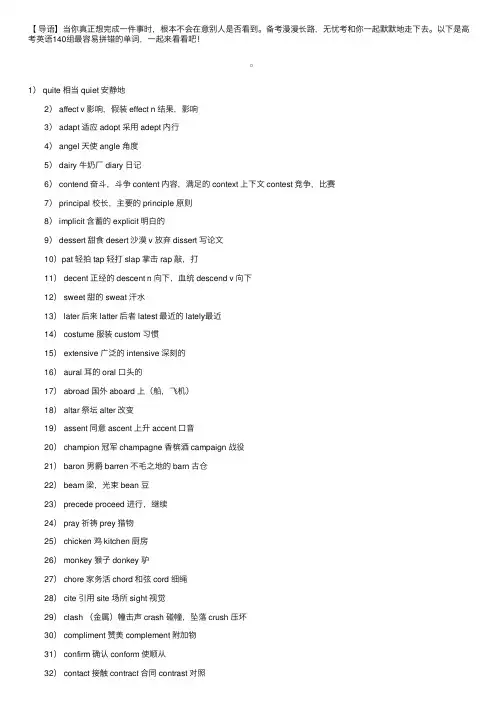
【导语】当你真正想完成⼀件事时,根本不会在意别⼈是否看到。
备考漫漫长路,⽆忧考和你⼀起默默地⾛下去。
以下是⾼考英语140组最容易拼错的单词,⼀起来看看吧!1) quite 相当 quiet 安静地 2) affect v 影响,假装 effect n 结果,影响 3) adapt 适应 adopt 采⽤ adept 内⾏ 4) angel 天使 angle ⾓度 5) dairy ⽜奶⼚ diary ⽇记 6) contend 奋⽃,⽃争 content 内容,满⾜的 context 上下⽂ contest 竞争,⽐赛 7) principal 校长,主要的 principle 原则 8) implicit 含蓄的 explicit 明⽩的 9) dessert 甜⾷ desert 沙漠 v 放弃 dissert 写论⽂ 10)pat 轻拍 tap 轻打 slap 掌击 rap 敲,打 11) decent 正经的 descent n 向下,⾎统 descend v 向下 12) sweet 甜的 sweat 汗⽔ 13) later 后来 latter 后者 latest 最近的 lately最近 14) costume 服装 custom 习惯 15) extensive ⼴泛的 intensive 深刻的 16) aural ⽿的 oral ⼝头的 17) abroad 国外 aboard 上(船,飞机) 18) altar 祭坛 alter 改变 19) assent 同意 ascent 上升 accent ⼝⾳ 20) champion 冠军 champagne ⾹槟酒 campaign 战役 21) baron 男爵 barren 不⽑之地的 barn 古仓 22) beam 梁,光束 bean ⾖ 23) precede proceed 进⾏,继续 24) pray 祈祷 prey 猎物 25) chicken 鸡 kitchen 厨房 26) monkey 猴⼦ donkey 驴 27) chore 家务活 chord 和弦 cord 细绳 28) cite 引⽤ site 场所 sight 视觉 29) clash (⾦属)幢击声 crash 碰幢,坠落 crush 压坏 30) compliment 赞美 complement 附加物 31) confirm 确认 conform 使顺从 32) contact 接触 contract 合同 contrast 对照 33) council 议会 counsel 忠告 consul 领事 34) crow 乌鸦 crown 王冠 clown ⼩丑 cow ⽜ 35) dose ⼀剂药 doze 打盹 36) drawn draw 过去分词 drown 溺⽔ 37) emigrant 移民到国外 immigrant 从某国来的移民 38) excess n 超过 exceed v超过 excel 擅长 39) hotel 青年旅社 hostel 旅店 40) latitude 纬度 altitude ⾼度 gratitude 感激 41) immoral 不道德的 immortal 不朽的 42) lone 孤独的 alone 单独的 lonely 寂寞的 43) mortal 不死的 metal ⾦属 mental 神经的 medal 勋章 model 模特meddle 玩弄 44) scare 惊吓 scarce 缺乏的 45) drought 天旱 draught 通风,拖拉 draughts (英)国际跳棋 47) assure 保证 ensure 使确定 insure 保险 48) except 除外 expect 期望 accept 接受 excerpt 选录 exempt 免除 49) floor 地板 flour ⾯粉 50) incident 事件 accident 意外 51) inspiration 灵感 aspiration 渴望 52) march 三⽉,前进 match ⽐赛 53) patent 专利 potent 有⼒的 potential 潜在的 54) police 警察 policy 政策 politics 政治 55) protest * protect 保护 56) require 需要 inquire 询问 enquire 询问 acquire 获得 57) suite ⼀(套,批) suit⼀套⾐服 58) revenge 报仇 avenge 为……报仇 59) story 故事 storey 楼层 store 商店 60) strike 打 stick 坚持 strict 严格的 61) expel 驱逐 repel 反击 impel 推动 dispel 驱散 62) rip 撕 ripe 熟的 63) wench 绞车 wrench 扭伤 64) confidant 知⼰ confident 有信⼼的 65) dine 吃饭 diner 吃饭⼈ dinning n 吃饭 dinner 晚饭 66) dreg 渣滓 drag 拖拉 67) faint 失去知觉 feint 佯攻 68) imprudence 轻率 impudence ⽆耻 69) specie 硬币 species 种类 70) hanger 钩⼦ hangar 棚⼚ hunger 饥饿 71) commerce 商业 commence 开始 72) through 通过 thorough 彻底的(al)though 尽管 thought think 过去分词 73) purpose ⽬的 suppose 假设 propose 建议 74) expect 期望 respect 尊敬 aspect ⽅⾯ inspect 视察 suspect 怀疑 75) glide 滑翔 slide 使滑⾏ slip 跌落 76) steal 偷 steel 钢 77) strive 努⼒ stride ⼤步⾛ 78) allusion 暗⽰ illusion 幻觉 delusion 错觉 elusion 逃避 79) prospect 前景 perspective *法 80) stationery ⽂具 stationary 固定的 81) loose 松的 lose 丢失 loss n 损失 lost lose过去式 82) amend 改正,修正 emend 校正 83) amoral unmoral immoral 同义不道德的 84) capitol ⼤厦 capital ⾸都 85) casual 随便的 causal 表原因的 86) extend 延伸 extent 长度 extant 现存的 87) inability 没能⼒ disability 残疾 88) personnel ⼈事 personal 个⼈的 89) statue 塑像 statute 法令 stature ⾝长 status 地位 90) widow 寡妇 window 窗户 91) socks 短袜 stockings 长筒袜 92) tax 税 taxi 出租 93) definite 不定的 infinite ⽆限的 94) grim 严酷的 grime 污点 95) crayon 蜡笔 canyon ⼭⾕ 96) recent 最近 resent ⽣⽓ 97) phrase 短语 phase 阶段 98) mission 使命 emission 散发,发射 mansion ⼤厦 99) vision 视觉 version 译本 100) gasp 上⽓不接下⽓ grasp 抓住 111) resemble 象…… assemble v 集合,装配 assembly n 集合,装配 112) assume 假定 resume 恢复 113) attain 达到 obtain 获得 abstain 放弃 114) award 授予 reward 奖赏 115) baggage (American English) luggage ⾏李 116) badge 徽章 bandage 绷带 117) blade ⼑刃 bald 秃的 bold ⼤胆 118) bloom 开花 blossom 开花(结果实) bosom 胸⼝ 119)blush 脸红 flush 发红(脸) 120) bride 新娘 bribe * 121) growl 咆哮 howl 狼叫 122) depress 使沮丧 suppress * oppress 压迫 123) dime ⼀⾓ dim 暗淡的 124) dizzy 眼花缭乱 dazzle 使眼花 125) brown 褐⾊ brow 眼眉 blow 打击 126) bullet ⼦弹 bulletin 公告 127) carton 纸板盒 cartoon 动画 128) chivalry 骑⼠精神 cavalry 骑兵队 129) collar 领⼦ cellar 地窖 color 颜⾊ 130) vanish 消失 evanish 使消失 131) intrude ⼊侵 extrude 逐出 detrude 推下 132) contort 扭弯 distort 弄弯 retort 反驳 133) eminent 杰出的 imminent 逼近的 134) decline 下降 recline 放置 incline 倾斜 135) exclaim 呼喊 proclaim 宣布 acclaim 欢呼 declaim 朗诵 136) edict 法令 indict 控告 137) perfuse 泼洒 profuse 浪费的 138) reject 拒绝 eject 逐出 inject 注射 deject 使沮丧 139) literacy 识字 literary ⽂学的 literature ⽂学 literal ⽂字的 140) median 中央的,中线的 medium 媒体。
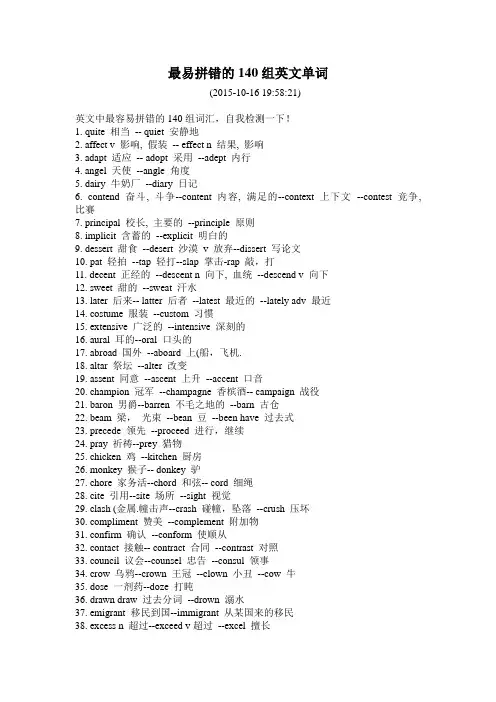
最易拼错的140组英文单词(2015-10-16 19:58:21)英文中最容易拼错的140组词汇,自我检测一下!1. quite 相当-- quiet 安静地2. affect v 影响, 假装-- effect n 结果, 影响3. adapt 适应-- adopt 采用--adept 内行4. angel 天使--angle 角度5. dairy 牛奶厂--diary 日记6. contend 奋斗, 斗争--content 内容, 满足的--context 上下文--contest 竞争, 比赛7. principal 校长, 主要的--principle 原则8. implicit 含蓄的--explicit 明白的9. dessert 甜食--desert 沙漠v 放弃--dissert 写论文10. pat 轻拍--tap 轻打--slap 掌击-rap 敲,打11. decent 正经的--descent n 向下, 血统--descend v 向下12. sweet 甜的--sweat 汗水13. later 后来-- latter 后者--latest 最近的--lately adv 最近14. costume 服装--custom 习惯15. extensive 广泛的--intensive 深刻的16. aural 耳的--oral 口头的17. abroad 国外--aboard 上(船,飞机.18. altar 祭坛--alter 改变19. assent 同意--ascent 上升--accent 口音20. champion 冠军--champagne 香槟酒-- campaign 战役21. baron 男爵--barren 不毛之地的--barn 古仓22. beam 梁,光束--bean 豆--been have 过去式23. precede 领先--proceed 进行,继续24. pray 祈祷--prey 猎物25. chicken 鸡--kitchen 厨房26. monkey 猴子-- donkey 驴27. chore 家务活--chord 和弦-- cord 细绳28. cite 引用--site 场所--sight 视觉29. clash (金属.幢击声--crash 碰幢,坠落--crush 压坏30. compliment 赞美--complement 附加物31. confirm 确认--conform 使顺从32. contact 接触-- contract 合同--contrast 对照33. council 议会--counsel 忠告--consul 领事34. crow 乌鸦--crown 王冠--clown 小丑--cow 牛35. dose 一剂药--doze 打盹36. drawn draw 过去分词--drown 溺水37. emigrant 移民到国--immigrant 从某国来的移民38. excess n 超过--exceed v超过--excel 擅长39. hotel 青年旅社--hostel 旅店40. latitude 纬度--altitude 高度--gratitude 感激41. immoral 不道德的--immortal 不朽的42. lone 孤独的--alone 单独的--lonely 寂寞的43. mortal 不死的--metal 金属--mental 神经的medal勋章--model 模特--meddle 玩弄44. scare 惊吓--scarce 缺乏的45. drought 天旱--draught 通风, 拖拉--draughts (英.国际跳棋46. assure 保证-ensure 使确定--insure 保险47. except 除外--expect 期望--accept 接受--excerpt 选录--exempt 免除48. floor 地板--flour 面粉49. incident 事件--accident 意外50. inspiration 灵感--aspiration 渴望51. march 三月, 前进--match 比赛52. patent 专利--potent 有力的--potential 潜在的53. police 警察--policy 政策--politics 政治54. protest 抗议--protect 保护55. require 需要--inquire 询问--enquire 询问--acquire 获得56. revenge 报仇--avenge 为...报仇57. story 故事--storey 楼层--store 商店58. strike 打--stick 坚持-- strict 严格的59. expand 扩张--expend 花费--extend 延长60. commerce 商业--commence 开始61. through 通过--thorough 彻底的--(al.though 尽管--thought think 过去分词62. purpose 目的--suppose 假设--propose 建议63. expect 期望--respect 尊敬-- aspect 方面-- inspect 视察--suspect 怀疑64. glide 滑翔--slide 使滑行--slip 跌落65. steal 偷--steel 钢66. strive 努力--stride 大步走67. allusion 暗示--illusion 幻觉--delusion 错觉--elusion 逃避68. prospect 前景--perspective 透视法69. stationery 文具--stationary 固定的70. loose 松的--lose 丢失-- loss n 损失-- lost lose过去式71. amend 改正, 修正--emend 校正72. amoral unmoral immoral 同义不道德的73. capitol 大厦--capital 首都74. casual 随便的--causal 表原因的75. extend 延伸--extent 长度--extant 现存的76. inability 没能力--disability 残疾77. personnel 人事--personal 个人的78. statue 塑像--statute 法令--stature 身长---status 地位79. widow 寡妇--window 窗户80. socks 短袜--stockings 长筒袜81. tax 税--taxi 出租82. definite 不定的--infinite 无限的83. grim 严酷的--grime 污点84. crayon 蜡笔--canyon 山谷85. recent 最近--resent 生气86. phrase 短语--phase 阶段87. mission 使命--emission 散发, 发射--mansion 大厦88. vision 视觉--version 译本89. gasp 上气不接下气--grasp 抓住90. delicate 微妙的--dedicate 献身91. idle 空闲的--idol 偶像92. induce 促使,劝诱--deduce 推测--reduce 减少--seduce 诱使93. lapse 流逝--elapse 消逝--eclipse 日食94. rude 粗鲁的--crude 天然的95. source 水源-- sauce 酱油-- saucer 茶托-- resource 资源--recourse 求援96. sled (儿童.雪橇-- sledge 雪橇97. stripe 条纹-- strip 条-- trip 旅行98. vocation 职业--vacation 假期--evocation 召集--revocation 撤回99. ardor 热情--adore 崇拜--adorn 装饰100. area 区域--era 时代101. resemble 象... --assemble v 集合,装配-- assembly n 集合, 装配102. assume 假定--resume 恢复103. attain 达到-- obtain 获得--abstain 放弃104. award 授予--reward 奖赏105. baggage (American English. luggage 行李106. badge 徽章--bandage 绷带107. blade 刀刃--bald 秃的--bold 大胆108. bloom 开花--blossom 开花(结果实.--bosom 胸口109.blush 脸红--flush 发红(脸.110. bride 新娘--bribe 贿赂111. growl 咆哮--howl 狼叫112. depress 使沮丧--suppress 镇压--oppress 压迫113. dime 一角-- dim 暗淡的114. brown 褐色--brow 眼眉--blow 打击115. bullet 子弹--bulletin 公告116. carton 纸板盒--cartoon 动画117. chivalry 骑士精神--cavalry 骑兵队118. collar 领子--cellar 地窖--color 颜色119. vanish 消失--evanish 使消失120. intrude 入侵--extrude 逐出--detrude 推下121. contort 扭弯--distort 弄弯--retort 反驳122. eminent 杰出的--imminent 逼近的123. decline 下降-- recline 放置--incline 倾斜124. exclaim 呼喊proclaim 宣布--acclaim 欢呼--declaim 朗诵125. edict 法令--indict 控告126. perfuse 泼洒--profuse 浪费的127. reject 拒绝--eject 逐出--inject 注射--deject 使沮丧128. literacy 识字--literary 文学的--literature 文学--literal 文字的129. median 中央的,中线的--medium 媒体130. expel 驱逐--repel 反击--impel 推动--dispel 驱散131. rip 撕--ripe 熟的132. wench 绞车--wrench 扭伤133. confidant 知己--confident 有信心的134. dine 吃饭-- diner 吃饭人-- dinning n 吃饭--dinner 晚饭135. dreg 渣滓--drag 拖拉136. faint 失去知觉--feint 佯攻137. imprudence 轻率--impudence 无耻138. specie 硬币--species 种类139. hanger 钩子-- hangar 棚厂--hunger 饥饿140. suite 一宾馆套房--suit一套衣服。
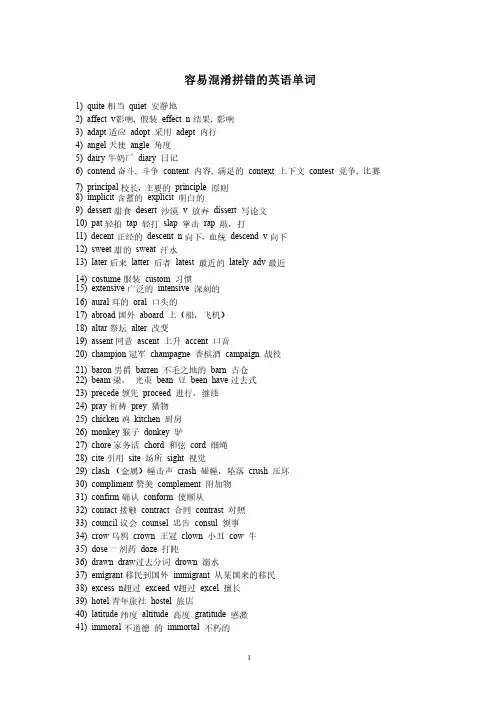
容易混淆拼错的英语单词1) quite 相当相当 quiet 安静地安静地2) affect v 影响影响, 假装假装 effect n 结果, 影响影响3) adapt 适应适应 adopt 采用采用 adept 内行内行4) angel 天使天使 angle 角度角度5) dairy 牛奶厂牛奶厂 diary 日记日记6) contend 奋斗, 斗争斗争 content 内容, 满足的满足的 context 上下文上下文 contest 竞争, 比赛比赛7) principal 校长, 主要的主要的 principle 原则原则 8) implicit 含蓄的含蓄的 explicit 明白的明白的9) dessert 甜食甜食 desert 沙漠沙漠 v 放弃放弃 dissert 写论文写论文10) pat 轻拍轻拍 tap 轻打轻打 slap 掌击掌击 rap 敲,打敲,打11) decent 正经的正经的 descent n 向下, 血统血统 descend v 向下向下12) sweet 甜的甜的 sweat 汗水汗水13) later 后来后来 latter 后者后者 latest 最近的最近的 lately adv 最近最近14) costume 服装服装 custom 习惯习惯15) extensive 广泛的广泛的 intensive 深刻的深刻的16) aural 耳的耳的 oral 口头的口头的17) abroad 国外国外 aboard 上(船,飞机)上(船,飞机)18) altar 祭坛祭坛 alter 改变改变19) assent 同意同意 ascent 上升上升 accent 口音口音20) champion 冠军冠军 champagne 香槟酒香槟酒 campaign 战役战役21) baron 男爵男爵 barren 不毛之地的不毛之地的 barn 古仓古仓22) beam 梁,梁, 光束光束 bean 豆 been have 过去式过去式23) precede 领先领先 proceed 进行,继续进行,继续24) pray 祈祷祈祷 prey 猎物猎物25) chicken 鸡 kitchen 厨房厨房26) monkey 猴子猴子 donkey 驴27) chore 家务活家务活 chord 和弦和弦 cord 细绳细绳28) cite 引用引用 site 场所场所 sight 视觉视觉29) clash (金属)幢击声(金属)幢击声 crash 碰幢,坠落碰幢,坠落 crush 压坏压坏30) compliment 赞美赞美 complement 附加物附加物31) confirm 确认确认 conform 使顺从使顺从32) contact 接触接触 contract 合同合同 contrast 对照对照33) council 议会议会 counsel 忠告忠告 consul 领事领事34) crow 乌鸦乌鸦 crown 王冠王冠 clown 小丑小丑 cow 牛35) dose 一剂药一剂药 doze 打盹打盹36) drawn draw 过去分词过去分词过去分词 drown 溺水溺水37) emigrant 移民到国外移民到国外 immigrant 从某国来的移民从某国来的移民38) excess n 超过超过超过 exceed v 超过超过 excel 擅长擅长39) hotel 青年旅社青年旅社 hostel 旅店旅店40) latitude 纬度纬度 altitude 高度高度 gratitude 感激感激41) immoral 不道德不道德 的 immortal 不朽的不朽的42) lone 孤独的孤独的 alone 单独的单独的 lonely 寂寞的寂寞的43) mortal 不死的不死的 metal 金属金属 mental 神经的神经的 medal 勋章勋章 model 模特meddle 玩弄玩弄44) scare 惊吓惊吓 scarce 缺乏的缺乏的 45) drought 天旱天旱 draught 通风, 拖 拉 draughts (英)国际跳棋国际跳棋47) assure 保证保证 ensure 使确定使确定 insure 保险保险48) except 除外除外 expect 期望期望 accept 接受接受 excerpt 选录选录 exempt 免除免除49) floor 地板地板 flour 面粉面粉50) incident 事件事件 accident 意外意外51) inspiration 灵感灵感 aspiration 渴望渴望52) march 三月, 前进前进 match 比赛比赛 53) patent 专利专利 potent 有力的有力的 potential 潜在的潜在的54) police 警察警察 policy 政策政策 politics 政治政治55) protest 抗议抗议 protect 保护保护56) require 需要需要 inquire 询问询问 enquire 询问询问 acquire 获得获得67) revenge 报仇报仇 avenge 为...报仇报仇68) story 故事故事 storey 楼层楼层 store 商店商店69) strike 打 stick 坚持坚持 strict 严格的严格的70) expand 扩张扩张 expend 花费花费 extend 延长延长71) commerce 商业商业 commence 开始开始72) through 通过通过 thorough 彻底的彻底的 (al)though 尽管尽管 thought think 过去分词过去分词73) purpose 目的目的 suppose 假设假设 propose 建议建议74) expect 期望期望 respect 尊敬尊敬 aspect 方面方面 inspect 视察视察 suspect 怀疑怀疑75) glide 滑翔滑翔 slide 使滑行使滑行 slip 跌落跌落76) steal 偷 steel 钢77) strive 努力努力 stride 大步走大步走78) allusion 暗示暗示 illusion 幻觉幻觉 delusion 错觉错觉 elusion 逃避逃避79) prospect 前景前景 perspective 透视法透视法80) stationery 文具文具 stationary 固定的固定的81) loose 松的松的 lose 丢失丢失 loss n 损失损失 lost lose 过去式过去式82) amend 改正, 修正修正 emend 校正校正83) amoral unmoral immoral 同义同义 不道德的不道德的84) capitol 大厦大厦 capital 首都首都85) casual 随便的随便的 causal 表原因的表原因的86) extend 延伸延伸 extent 长度长度 extant 现存的现存的87) inability 没能力没能力 disability 残疾残疾88) personnel 人事人事 personal 个人的个人的89) statue 塑像塑像 statute 法令法令 stature 身长身长 status 地位地位90) widow 寡?window 窗户窗户91) socks 短袜短袜 stockings 长筒袜长筒袜92) tax 税 taxi 出租出租93) definite 不定的不定的 infinite 无限的无限的94) grim 严酷的严酷的 grime 污点污点95) crayon 蜡笔蜡笔 canyon 山谷山谷96) recent 最近最近 resent 生气生气97) phrase 短语短语 phase 阶段阶段98) mission 使命使命 emission 散发, 发射发射 mansion 大厦大厦99) vision 视觉视觉 version 译本译本 100) gasp 上气不接下气上气不接下气 grasp 抓住抓住101) delicate 微妙的微妙的 dedicate 献身献身101) idle 空闲的空闲的 idol 偶像偶像102) induce 促使,劝诱劝诱 deduce 推测推测 reduce 减少减少 seduce 诱使诱使 103) lapse 流逝流逝 elapse 消逝消逝 eclipse 日食日食104) rude 粗鲁的粗鲁的 crude 天然的天然的105) source 水源水源 sauce 酱油酱油 saucer 茶托茶托 resource 资源资源 recourse 求援求援 106) sled (儿童)雪橇雪橇 sledge 雪橇雪橇107) stripe 条纹条纹 strip 条 trip 旅行旅行108) vocation 职业职业 vacation 假期假期 evocation 召集召集 revocation 撤回撤回 109) ardor 热情热情 adore 崇拜崇拜 adorn 装饰装饰110) area 区域区域 era 时代时代111) resemble 象... assemble v 集合集合,装配装配 assembly n 集合, 装配装配 112) assume 假定假定 resume 恢复恢复113) attain 达到达到 obtain 获得获得 abstain 放弃放弃114) award 授予授予 reward 奖赏奖赏115) baggage (American English) luggage 行李行李116) badge 徽章徽章 bandage 绷带绷带117) blade 刀刃刀刃 bald 秃的秃的 bold 大胆大胆118) bloom 开花开花 blossom 开花(结果实) bosom 胸口胸口 119)blush 脸红脸红 flush 发红(脸) 120) bride 新娘新娘 bribe 贿赂贿赂121) growl 咆哮咆哮 howl 狼叫狼叫122) depress 使沮丧使沮丧 suppress 镇压镇压 oppress 压迫压迫 123) dime 一角一角 dim 暗淡的暗淡的124) dizzy 眼花缭乱眼花缭乱 dazzle 使眼花使眼花125) brown 褐色褐色 brow 眼眉眼眉 blow 打击打击126) bullet 子弹子弹 bulletin 公告公告127) carton 纸板盒纸板盒 cartoon 动画动画128) chivalry 骑士精神骑士精神 cavalry 骑兵队骑兵队129) collar 领子领子 cellar 地窖地窖 color 颜色颜色130) vanish 消失消失 evanish 使消失使消失131) intrude 入侵入侵 extrude 逐出逐出 detrude 推下推下132) contort 扭弯扭弯 distort 弄弯弄弯 retort 反驳反驳133) eminent 杰出的杰出的 imminent 逼近的逼近的134) decline 下降下降 recline 放置放置 incline 倾斜倾斜135) exclaim 呼喊呼喊 proclaim 宣布宣布 acclaim 欢呼欢呼 declaim 朗诵朗诵 136) edict 法令法令 indict 控告控告137) perfuse 泼洒泼洒 profuse 浪费的浪费的138) reject 拒绝拒绝 eject 逐出逐出 inject 注射注射 deject 使沮丧使沮丧 139) literacy 识字识字 literary 文学的文学的 literature 文学文学 literal 文字的文字的140) median 中央的,中线的中线的 medium 媒体媒体 141) expel 驱逐驱逐 repel 反击反击 impel 推动推动 dispel 驱散驱散 142) rip 撕 ripe 熟的熟的 143) wench 绞车绞车 wrench 扭伤扭伤144) confidant 知己知己 confident 有信心的有信心的 145) dine 吃饭吃饭 diner 吃饭人吃饭人 dinning n 吃饭吃饭 dinner 晚饭晚饭 146) dreg 渣滓渣滓 drag 拖拉拖拉147) faint 失去知觉失去知觉 feint 佯攻佯攻148) imprudence 轻率轻率 impudence 无耻无耻 149) specie 硬币硬币 species 种类种类 150) hanger 钩子钩子 hangar 棚厂棚厂 hunger 饥饿饥饿 151) suite 一(套,批) suit 一套衣服一套衣服。
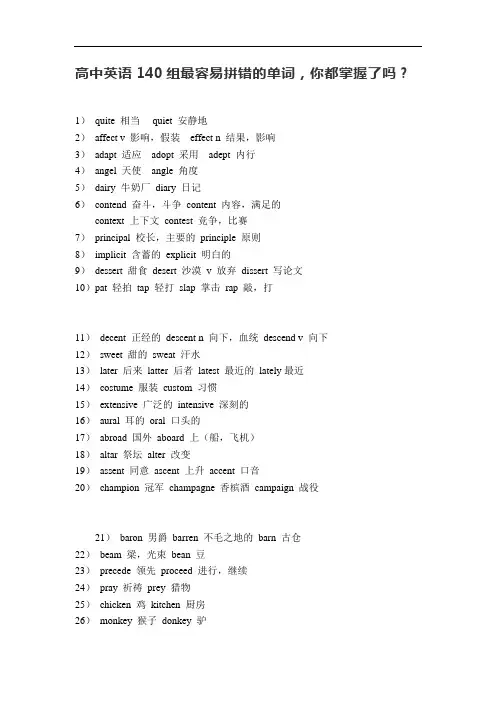
高中英语140组最容易拼错的单词,你都掌握了吗?1)quite 相当 quiet 安静地2)affect v 影响,假装 effect n 结果,影响3)adapt 适应 adopt 采用 adept 内行4)angel 天使 angle 角度5)dairy 牛奶厂 diary 日记6)contend 奋斗,斗争content 内容,满足的context 上下文contest 竞争,比赛7)principal 校长,主要的principle 原则8)implicit 含蓄的explicit 明白的9)dessert 甜食desert 沙漠v 放弃dissert 写论文10)pat 轻拍tap 轻打slap 掌击rap 敲,打11)decent 正经的descent n 向下,血统descend v 向下12)sweet 甜的sweat 汗水13)later 后来latter 后者latest 最近的lately最近14)costume 服装custom 习惯15)extensive 广泛的intensive 深刻的16)aural 耳的oral 口头的17)abroad 国外aboard 上(船,飞机)18)altar 祭坛alter 改变19)assent 同意ascent 上升accent 口音20)champion 冠军champagne 香槟酒campaign 战役21)baron 男爵barren 不毛之地的barn 古仓22)beam 梁,光束bean 豆23)precede 领先proceed 进行,继续24)pray 祈祷prey 猎物25)chicken 鸡kitchen 厨房26)monkey 猴子donkey 驴27)chore 家务活chord 和弦cord 细绳28)cite 引用site 场所sight 视觉29)clash (金属)幢击声crash 碰幢,坠落crush 压坏30)compliment 赞美complement 附加物31)confirm 确认conform 使顺从32)contact 接触contract 合同contrast 对照33)council 议会counsel 忠告consul 领事34)crow 乌鸦crown 王冠clown 小丑cow 牛35)dose 一剂药doze 打盹36)drawn draw 过去分词drown 溺水37)emigrant 移民到国外immigrant 从某国来的移民38)excess n 超过exceed v超过excel 擅长39)hotel 青年旅社hostel 旅店40)latitude 纬度altitude 高度gratitude 感激41)immoral 不道德的immortal 不朽的42)lone 孤独的alone 单独的lonely 寂寞的43)mortal 不死的metal 金属mental 神经的medal 勋章model 模特meddle 玩弄44)scare 惊吓scarce 缺乏的45)drought 天旱draught 通风,拖拉draughts (英)国际跳棋47)assure 保证ensure 使确定insure 保险48)except 除外expect 期望accept 接受excerpt 选录exempt 免除49)floor 地板flour 面粉50)incident 事件accident 意外51)inspiration 灵感aspiration 渴望52)march 三月,前进match 比赛53)patent 专利potent 有力的potential 潜在的54)police 警察policy 政策politics 政治55)protest 抗议protect 保护56)require 需要inquire 询问enquire 询问acquire 获得57)suite 一(套,批)suit一套衣服58)revenge 报仇avenge 为……报仇59)story 故事storey 楼层store 商店60)strike 打stick 坚持strict 严格的61)expel 驱逐repel 反击impel 推动dispel 驱散62)rip 撕ripe 熟的63)wench 绞车wrench 扭伤64)confidant 知己confident 有信心的65)dine 吃饭diner 吃饭人dinning n 吃饭dinner 晚饭66)dreg 渣滓drag 拖拉67)faint 失去知觉feint 佯攻68)imprudence 轻率impudence 无耻69)specie 硬币species 种类70)hanger 钩子hangar 棚厂hunger 饥饿71)commerce 商业commence 开始72)through 通过thorough 彻底的(al)though 尽管thought think 过去分词73)purpose 目的suppose 假设propose 建议74)expect 期望respect 尊敬aspect 方面inspect 视察suspect 怀疑75)glide 滑翔slide 使滑行slip 跌落76)steal 偷steel 钢77)strive 努力stride 大步走78)allusion 暗示illusion 幻觉delusion 错觉elusion 逃避79)prospect 前景perspective 透视法80)stationery 文具stationary 固定的81)loose 松的lose 丢失loss n 损失lost lose过去式82)amend 改正,修正emend 校正83)amoral unmoral immoral 同义不道德的84)capitol 大厦capital 首都85)casual 随便的causal 表原因的86)extend 延伸extent 长度extant 现存的87)inability 没能力disability 残疾88)personnel 人事personal 个人的89)statue 塑像statute 法令stature 身长status 地位90)widow 寡妇window 窗户91)socks 短袜stockings 长筒袜92)tax 税taxi 出租93)definite 不定的infinite 无限的94)grim 严酷的grime 污点95)crayon 蜡笔canyon 山谷96)recent 最近resent 生气97)phrase 短语phase 阶段98)mission 使命emission 散发,发射mansion 大厦99)vision 视觉version 译本100)gasp 上气不接下气grasp 抓住101)delicate 微妙的dedicate 献身101)idle 空闲的idol 偶像102)induce 促使,劝诱deduce 推测reduce 减少seduce 诱使103)lapse 流逝elapse 消逝eclipse 日食104)rude 粗鲁的crude 天然的105)source 水源sauce 酱油saucer 茶托resource 资源recourse 求援106)sled (儿童)雪橇sledge 雪橇107)stripe 条纹strip 条trip 旅行108)vocation 职业vacation 假期evocation 召集revocation 撤回109)ardor 热情adore 崇拜adorn 装饰110)area 区域era 时代111)resemble 象…… assemble v 集合,装配assembly n 集合,装配112)assume 假定resume 恢复113)attain 达到obtain 获得abstain 放弃114)award 授予reward 奖赏115)baggage (American English)luggage 行李116)badge 徽章bandage 绷带117)blade 刀刃bald 秃的bold 大胆118)bloom 开花blossom 开花(结果实)bosom 胸口119)blush 脸红flush 发红(脸)120)bride 新娘bribe 贿赂121)growl 咆哮howl 狼叫122)depress 使沮丧suppress 镇压oppress 压迫123)dime 一角dim 暗淡的124)dizzy 眼花缭乱dazzle 使眼花125)brown 褐色brow 眼眉blow 打击126)bullet 子弹bulletin 公告127)carton 纸板盒cartoon 动画128)chivalry 骑士精神cavalry 骑兵队129)collar 领子cellar 地窖color 颜色130)vanish 消失evanish 使消失131)intrude 入侵extrude 逐出detrude 推下132)contort 扭弯distort 弄弯retort 反驳133)eminent 杰出的imminent 逼近的134)decline 下降recline 放置incline 倾斜135)exclaim 呼喊proclaim 宣布acclaim 欢呼declaim 朗诵136)edict 法令indict 控告137)perfuse 泼洒profuse 浪费的138)reject 拒绝eject 逐出inject 注射deject 使沮丧139)literacy 识字literary 文学的literature 文学literal 文字的140)median 中央的,中线的medium 媒体。
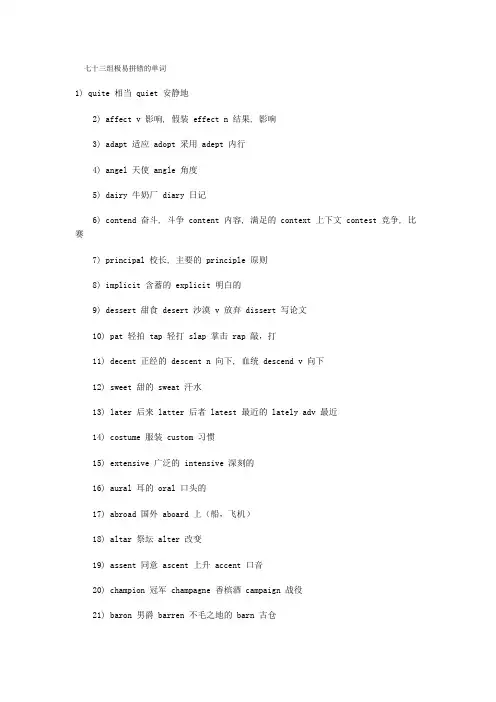
七十三组极易拼错的单词1) quite 相当 quiet 安静地2) affect v 影响, 假装 effect n 结果, 影响3) adapt 适应 adopt 采用 adept 内行4) angel 天使 angle 角度5) dairy 牛奶厂 diary 日记6) contend 奋斗, 斗争 content 内容, 满足的 context 上下文 contest 竞争, 比赛7) principal 校长, 主要的 principle 原则8) implicit 含蓄的 explicit 明白的9) dessert 甜食 desert 沙漠 v 放弃 dissert 写论文10) pat 轻拍 tap 轻打 slap 掌击 rap 敲,打11) decent 正经的 descent n 向下, 血统 descend v 向下12) sweet 甜的 sweat 汗水13) later 后来 latter 后者 latest 最近的 lately adv 最近14) costume 服装 custom 习惯15) extensive 广泛的 intensive 深刻的16) aural 耳的 oral 口头的17) abroad 国外 aboard 上(船,飞机)18) altar 祭坛 alter 改变19) assent 同意 ascent 上升 accent 口音20) champion 冠军 champagne 香槟酒 campaign 战役21) baron 男爵 barren 不毛之地的 barn 古仓22) beam 梁,光束 bean 豆 been have 过去式23) precede 领先 proceed 进行,继续24) pray 祈祷 prey 猎物25) chicken 鸡 kitchen 厨房26) monkey 猴子 donkey 驴27) chore 家务活 chord 和弦 cord 细绳28) cite 引用 site 场所 sight 视觉29) clash (金属)幢击声 crash 碰幢,坠落 crush 压坏30) compliment 赞美 complement 附加物31) confirm 确认 conform 使顺从32) contact 接触 contract 合同 contrast 对照33) council 议会 counsel 忠告 consul 领事34) crow 乌鸦 crown 王冠 clown 小丑 cow 牛35) dose 一剂药 doze 打盹36) drawn draw 过去分词 drown 溺水37) emigrant 移民到国外 immigrant 从某国来的移民38) excess n 超过 exceed v超过 excel 擅长39) hotel 青年旅社 hostel 旅店40) latitude 纬度 altitude 高度 gratitude 感激41) immoral 不道德的 immortal 不朽的42) lone 孤独的 alone 单独的 lonely 寂寞的43) mortal 不死的 metal 金属 mental 神经的 medal 勋章 model 模特meddle 玩弄44) scare 惊吓 scarce 缺乏的45) drought 天旱 draught 通风, 拖拉 draughts (英)国际跳棋47) assure 保证 ensure 使确定 insure 保险48) except 除外 expect 期望 accept 接受 excerpt 选录 exempt 免除49) floor 地板 flour 面粉50) incident 事件 accident 意外51) inspiration 灵感 aspiration 渴望52) march 三月, 前进 match 比赛53) patent 专利 potent 有力的 potential 潜在的54) police 警察 policy 政策 politics 政治55) protest 抗议 protect 保护56) require 需要 inquire 询问 enquire 询问 acquire 获得57) revenge 报仇 avenge 为...报仇58) story 故事 storey 楼层 store 商店59) strike 打 stick 坚持 strict 严格的60) expand 扩张 expend 花费 extend 延长61) commerce 商业 commence 开始62) through 通过 thorough 彻底的 (al)though 尽管 thought think 过去分词63) purpose 目的 suppose 假设 propose 建议64) expect 期望 respect 尊敬 aspect 方面 inspect 视察 suspect 怀疑65) glide 滑翔 slide 使滑行 slip 跌落66) steal 偷 steel 钢67) strive 努力 stride 大步走68) allusion 暗示 illusion 幻觉 delusion 错觉 elusion 逃避69) prospect 前景 perspective 透视法70) stationery 文具 stationary 固定的71) loose 松的 lose 丢失 loss n 损失 lost lose过去式72) amend 改正, 修正 emend 校正73) amoral unmoral immoral 同义不道德的。
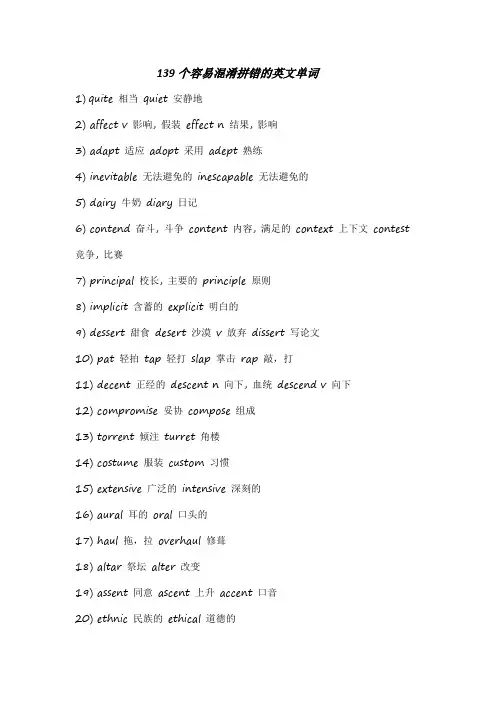
139个容易混淆拼错的英文单词1)quite 相当 quiet 安静地2) affect v 影响, 假装 effect n 结果, 影响3) adapt 适应 adopt 采用 adept 熟练4) inevitable 无法避免的 inescapable 无法避免的5) dairy 牛奶 diary 日记6) contend 奋斗, 斗争 content 内容, 满足的 context 上下文 contest 竞争, 比赛7) principal 校长, 主要的 principle 原则8) implicit 含蓄的 explicit 明白的9) dessert 甜食 desert 沙漠 v 放弃 dissert 写论文10) pat 轻拍 tap 轻打 slap 掌击 rap 敲,打11) decent 正经的 descent n 向下, 血统 descend v 向下12) compromise 妥协 compose 组成13) torrent 倾注 turret 角楼14) costume 服装 custom 习惯15) extensive 广泛的 intensive 深刻的16) aural 耳的 oral 口头的17) haul 拖,拉 overhaul 修葺18) altar 祭坛 alter 改变19) assent 同意 ascent 上升 accent 口音20) ethnic 民族的 ethical 道德的21) economic 有关经济的 economical 实惠的22) historic 有历史意义的 historical 与历史有关的23) precede 领先 proceed 进行,继续24) pray 祈祷 prey 猎物25) bazaar 义卖 blizzard 暴风雪 bizarre 怪诞的 hazard 危险26) imperial 皇室的 imperil 危及27) indiscriminate 不加选择的 incriminate 牵连,控告28) cite 引用 site 场所29) clash (金属)幢击声 crash 碰幢,坠落 crush 压坏30) compliment 赞美 complement 附加物31) confirm 确认 conform 使顺从32) zeal 热情 sleazy 低劣的33) council 议会 counsel 忠告 consul 领事34) crow 乌鸦 crown 王冠 clown 小丑35) dose 一剂药 doze 打盹36) drawn draw 过去分词 drown 溺水37) emigrant 移民到国外 immigrant 从某国来的移民38) excess n 超过 exceed v超过 excel 擅长39) hotel 青年旅社 hostel 旅店40) latitude 纬度 altitude 高度41) immoral 不道德的 immortal 不朽的42) rustic 乡村的 rusty 生锈的43) rampart 壁垒 rampant 猖獗的44) scare 惊吓 scarce 缺乏的45) drought 天旱 draught 通风, 拖拉 draughts (英)国际跳棋47) assure 保证 ensure 使确定 insure 保险48) raucous 沙哑的 ruckus 吵闹49) arbitrary 专制的 arbitrate 仲裁50) argument 争论 augment 增加51) perpetuate 使不朽 perpetrate 犯罪52) duck 躲避 dock 码头53) patent 专利 potent 有力的54) expedition 远征 expedient 权宜之计55) plunder 掠夺 loot 掠夺56) require 需要 inquire 询问 enquire 询问 acquire 获得67) revenge 报仇 avenge 为...报仇68) irrespective 不考虑的 respective 各自的 respectable 值得尊敬的respectful 表示尊敬的 respecting 关于/现在进行时69) accomplice 共犯 appliance 应用,器具70) expand 扩张 expend 花费71) valuable 有价值的 voluble 健谈的72) abdicate 让位 abduct 绑架73) corollary 推理 corroborate 证实74) exult 狂喜 exalt 赞扬,提升75) glide 滑翔 slide 使滑行 slip 跌落76) anaesthesia 麻醉 aesthetic 美学的77) genius 天才 genial 亲切的 genuine 真诚的78) allusion 暗示 illusion 幻觉 delusion 错觉 elusion 逃避79) prospect 前景 perspective 透视法80) stationery 文具 stationary 固定的81)esteem 尊敬 steem 无数的 teem 充满82) amend 改正, 修正 emend 校正83) amble 漫步 amber 琥珀84) capitol 大厦 capital 首都85) casual 随便的 causal 表原因的86) extend 延伸 extent 长度 extant 现存的87) wield 辉 weld 焊接88) personnel 人事 personal 个人的89) statue 塑像 statute 法令 stature 身长 status 地位90) subside 下陷 subsidy 补贴91) mortal 致命的 mortar 灰泥,迫击炮92) exponent 拥护者 proponent 提倡者93) feudal 封建的 feud 世仇 pseudo 假的94) grim 严酷的 grime 污点95) boom 繁荣 boon 恩赐96) margin 边缘,利润 marginal 边际的,微小的97) foul 恶臭的 fowl 禽肉98) conscious 意识到的 conscience 良心99) paunchy 大肚子 punch 打100) gasp 上气不接下气 grasp 抓住101) weary 疲倦,厌烦 wary 机警的101) brim 边缘 trim 修剪,装饰102) induce 促使,劝诱 deduce 推测 reduce 减少 seduce 诱使103) lapse 流逝 elapse 消逝 eclipse 日食104) differential 差别的 deferential 恭敬的105) source 水源 sauce 酱油 saucer 茶托 resource 资源 recourse 求援106) sled (儿童)雪橇 sledge 雪橇107) stripe 条纹 strip 条108) vocation 职业 vacation 假期 evocation 召集 revocation 撤回109) ardor 热情 adore 崇拜 adorn 装饰110) segregate 分离 integrate 结合 aggregate 使聚集111) resemble 象... assemble v 集合,装配 assembly n 集合, 装配112) attain 达到 obtain 获得 abstain 放弃113) award 授予 reward 奖赏114) baggage (American English) luggage 行李badge 徽章 bandage 绷带115) blade 刀刃 bald 秃的 bold 大胆116) bloom 开花 blossom 开花(结果实) bosom 胸口117) depress 使沮丧 suppress 镇压 oppress 压迫118) dizzy 眼花缭乱 dazzle 使眼花119)bullet 子弹 bulletin 公告120) chivalry 骑士精神 cavalry 骑兵队121)collar 领子 cellar 地窖122) vanish 消失 evanish 使消失123)intrude 入侵 extrude 逐出 detrude 推下124) dizzy 眼花缭乱 dazzle 使眼花125)contort 扭弯 distort 弄弯 retort 反驳126) eminent 杰出的 imminent 逼近的127)decline 下降 recline 放置 incline 倾斜128) exclaim 呼喊 proclaim 宣布 acclaim 欢呼 declaim 朗诵129)edict 法令 indict 控告130) perfuse 泼洒 profuse 浪费的131) reject 拒绝 eject 逐出 inject 注射 deject 使沮丧132) literacy 识字 literary 文学的 literature 文学 literal 文字的133) expel 驱逐 repel 反击 impel 推动 dispel 驱散 repeal 撤销propel 推进134) rip 撕 ripe 熟的135) wench 绞车 wrench 扭伤136) dreg 渣滓 drag 拖拉 crag 峭壁 scrag 骨瘦如柴的人或动物137) imprudence 轻率 impudence 无耻138) specie 硬币 species 种类139) hanger 钩子 hangar 棚厂 hunger 饥饿。
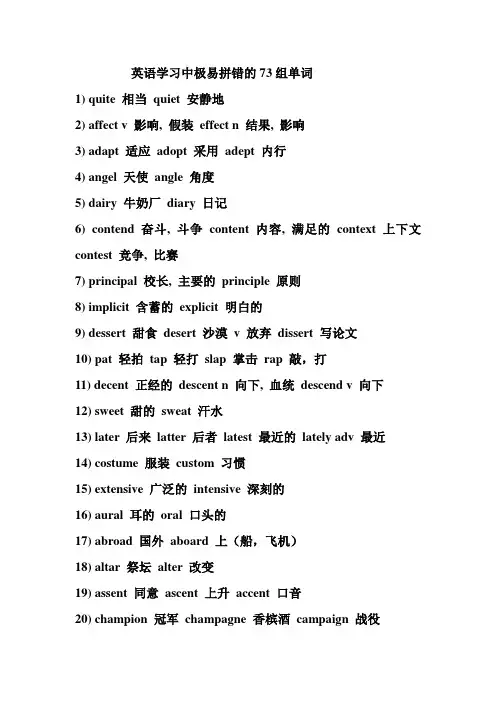
英语学习中极易拼错的73组单词1) quite 相当quiet 安静地2) affect v 影响, 假装effect n 结果, 影响3) adapt 适应adopt 采用adept 内行4) angel 天使angle 角度5) dairy 牛奶厂diary 日记6) contend 奋斗, 斗争content 内容, 满足的context 上下文contest 竞争, 比赛7) principal 校长, 主要的principle 原则8) implicit 含蓄的explicit 明白的9) dessert 甜食desert 沙漠v 放弃dissert 写论文10) pat 轻拍tap 轻打slap 掌击rap 敲,打11) decent 正经的descent n 向下, 血统descend v 向下12) sweet 甜的sweat 汗水13) later 后来latter 后者latest 最近的lately adv 最近14) costume 服装custom 习惯15) extensive 广泛的intensive 深刻的16) aural 耳的oral 口头的17) abroad 国外aboard 上(船,飞机)18) altar 祭坛alter 改变19) assent 同意ascent 上升accent 口音20) champion 冠军champagne 香槟酒campaign 战役21) baron 男爵barren 不毛之地的barn 古仓22) beam 梁,光束bean 豆been have 过去式23) precede 领先proceed 进行,继续24) pray 祈祷prey 猎物25) chicken 鸡kitchen 厨房26) monkey 猴子donkey 驴27) chore 家务活chord 和弦cord 细绳28) cite 引用site 场所sight 视觉29) clash (金属)幢击声crash 碰幢,坠落crush 压坏30) compliment 赞美complement 附加物31) confirm 确认conform 使顺从32) contact 接触contract 合同contrast 对照33) council 议会counsel 忠告consul 领事34) crow 乌鸦crown 王冠clown 小丑cow 牛35) dose 一剂药doze 打盹36) drawn draw 过去分词drown 溺水37) emigrant 移民到国外immigrant 从某国来的移民38) excess n 超过exceed v超过excel 擅长39) hotel 青年旅社hostel 旅店40) latitude 纬度altitude 高度gratitude 感激41) immoral 不道德的immortal 不朽的42) lone 孤独的alone 单独的lonely 寂寞的43) mortal 不死的metal 金属mental 神经的medal 勋章model 模特meddle 玩弄44) scare 惊吓scarce 缺乏的45) drought 天旱draught 通风, 拖拉draughts (英)国际跳棋47) assure 保证ensure 使确定insure 保险48) except 除外expect 期望accept 接受excerpt 选录exempt 免除49) floor 地板flour 面粉50) incident 事件accident 意外51) inspiration 灵感aspiration 渴望52) march 三月, 前进match 比赛53) patent 专利potent 有力的potential 潜在的54) police 警察policy 政策politics 政治55) protest 抗议protect 保护56) require 需要inquire 询问enquire 询问acquire 获得57) revenge 报仇avenge 为...报仇58) story 故事storey 楼层store 商店59) strike 打stick 坚持strict 严格的60)expand 扩张expend 花费extend 延长61) commerce 商业commence 开始62) through 通过thorough 彻底的(al)though 尽管thought think 过去分词63) purpose 目的suppose 假设propose 建议64) expect 期望respect 尊敬aspect 方面inspect 视察suspect 怀疑65) glide 滑翔slide 使滑行slip 跌落66) steal 偷steel 钢67) strive 努力stride 大步走68) allusion 暗示illusion 幻觉delusion 错觉elusion 逃避69) prospect 前景perspective 透视法70) stationery 文具stationary 固定的71) loose 松的lose 丢失loss n 损失lost lose过去式72) amend 改正, 修正emend 校正73) amoral unmoral immoral 同义不道德的。
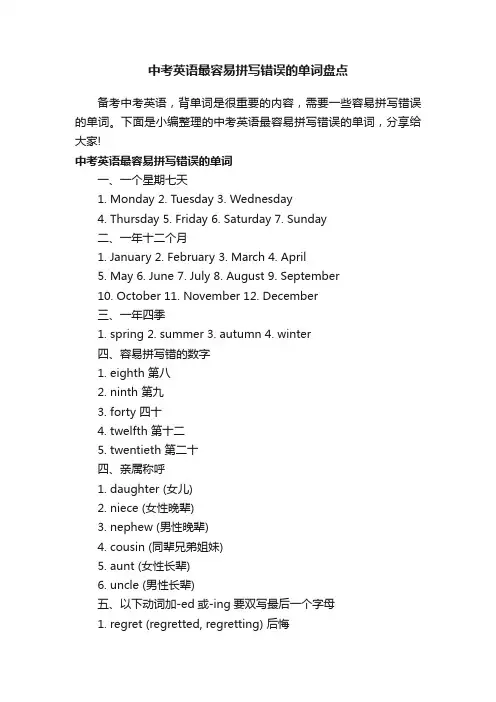
中考英语最容易拼写错误的单词盘点备考中考英语,背单词是很重要的内容,需要一些容易拼写错误的单词。
下面是小编整理的中考英语最容易拼写错误的单词,分享给大家!中考英语最容易拼写错误的单词一、一个星期七天1. Monday2. Tuesday3. Wednesday4. Thursday5. Friday6. Saturday7. Sunday二、一年十二个月1. January2. February3. March4. April5. May6. June7. July8. August9. September10. October 11. November 12. December三、一年四季1. spring2. summer3. autumn4. winter四、容易拼写错的数字1. eighth 第八2. ninth 第九3. forty 四十4. twelfth 第十二5. twentieth 第二十四、亲属称呼1. daughter (女儿)2. niece (女性晚辈)3. nephew (男性晚辈)4. cousin (同辈兄弟姐妹)5. aunt (女性长辈)6. uncle (男性长辈)五、以下动词加-ed或-ing要双写最后一个字母1. regret (regretted, regretting) 后悔2. control (controlled, controlling) 控制3. admit (admitted, admitting) 承认4. occur (occurred, occurring) 出现5 .prefer (preferred, preferring) 宁愿6. refer (referred, referring) 提到7. forget (forgetting ) 忘记8. permit (permitted, permitting)允许9. equip (equipped, equipping) 装备注意:quarrel, signal, travel中的l可双写(英国英语)也可不双写(美国英语)六、部分过去式和过去分词不规则变化的动词1. broadcast (broadcast, broadcast) 广播2. flee (fled, fled) 逃跑3. forbid (forbade, forbidden) 禁止4. forgive (forgave, forgiven) 原谅5. freeze (froze, frozen) 结冰6. hang (作“绞死”讲,是规则的;作“悬挂”讲,其过去式过去分词都是hung)7. lie (作“说谎”讲时,是规则的;作“位于”讲时,其过去式是lay,过去分词是lain)8. seek (sought, sought) 寻求9. shake (shook, shaken) 发抖10. sing (sang, sung) 唱歌11. sink (sank, sunk/sunken) 下沉12. spread (spread, spread) 传播13. swim (swam, swum) 游泳14. tear (tore, torn) 撕碎15. weave (wove, woven) 编织七、意思相近的词1. check / examine/ test2. receive / accept3. destroy /damage4. celebrate/ congratulate5. wear / dress八、注意形容词变名词时的拼写变化1. long—length 长度2. wide—width 宽度3. high—height 高度4. strong—strength力量5. wise-- wisdom6. warm- warmth7. deep- depth8. curious – curiosity9. prove (v.) - proof (复数加s)10. believe-belief (复数加s)11. tired – tiredness12. real- reality13. young – youth九、以-ic结尾的动词,应先把-ic变为-ick,再加ing或ed1.picnic (picnicked, picnicking) 野餐十、个别名词的复数拼写1. German (Germans) 德国人2. gulf (gulfs) 海湾3. handkerchief (handkerchiefs) 手帕4. hero (英雄),potato (土豆),tomato (西红柿) 等有生命的以-o结尾的名词变复数时要加-es。
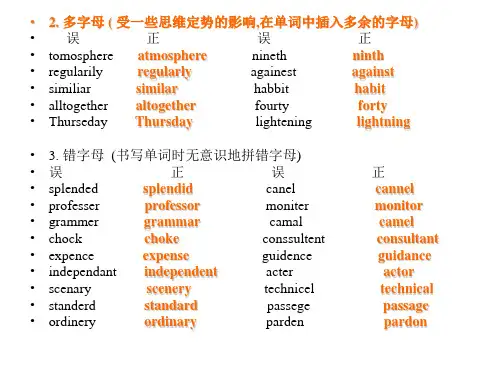
英语考试最容易拼错的单词一、一个星期七天1. Monday2. Tuesday3. Wednesday4. Thursday5. Friday6. Saturday7. Sunday二、一年十二个月1. January2. February3. March4. April5. May6. June7. July8. August9. September10. October 11. November 12. December三、一年四季1. spring2. summer3. autumn4. winter四、容易拼写错的数字1. eighth 第八2. ninth 第九3. forty 四十4. twelfth 第十二5. twentieth 第二十五、亲属称呼1. daughter (女儿)2. niece (女性晚辈)3. nephew (男性晚辈)4. cousin (同辈兄弟姐妹)5. aunt (女性长辈)6. uncle (男性长辈)六、以下动词加-ed或-ing要双写最后一个字母1. regret (regretted, regretting) 后悔2. control (controlled, controlling) 控制3. admit (admitted, admitting) 承认4. occur (occurred, occurring) 出现5 .prefer (preferred, preferring) 宁愿6. refer (referred, referring) 提到7. forget (forgetting ) 忘记8. permit (permitted, permitting)允许9. equip (equipped, equipping) 装备注意:quarrel, signal, travel中的l可双写(英国英语)也可不双写(美国英语)七、部分过去式和过去分词不规则变化的动词1. broadcast (broadcast, broadcast) 广播2. flee (fled, fled) 逃跑3. forbid (forbade, forbidden) 禁止4. forgive (forgave, forgiven) 原谅5. freeze (froze, frozen) 结冰6. hang (作“绞死”讲,是规则的;作“悬挂”讲,其过去式过去分词都是hung)7. lie (作“说谎”讲时,是规则的;作“位于”讲时,其过去式是lay,过去分词是lain)8. seek (sought, sought) 寻求9. shake (shook, shaken) 发抖10. sing (sang, sung) 唱歌11. sink (sank, sunk/sunken) 下沉12. spread (spread, spread) 传播13. swim (swam, swum) 游泳14. tear (tore, torn) 撕碎15. weave (wove, woven) 编织八、意思相近的词1. check / examine/ test2. receive / accept3. destroy /damage4. celebrate/ congratulate5. wear / dress九、注意形容词变名词时的拼写变化1. long—length 长度2. wide—width 宽度3. high—height 高度4. strong—strength力量5. wise-- wisdom6. warm- warmth7. deep- depth8. curious – curiosity9. prove (v.) - proof (复数加s)10. believe-belief (复数加s)11. tired – tiredness12. real- reality13. young – youth十、以-ic结尾的动词,应先把-ic变为-ick,再加ing或ed1.picnic (picnicked, picnicking) 野餐十一、个别名词的复数拼写1. German (Germans) 德国人2. gulf (gulfs) 海湾3. handkerchief (handkerchiefs) 手帕4. hero (英雄),potato (土豆),tomato (西红柿) 等有生命的以-o结尾的名词变复数时要加-es。
76组极易拼错的英文单词Champion冠军--- campaign竞选probably---probobalyquite 相当quiet 安静地harassment--- harassmentaffect v 影响, 假装--- effect n 结果, 影响descendent---decendentadapt 适应--- adopt 采用--- adept 内行angel 天使--- angle 角度dairy 牛奶厂--- diary 日记contend 奋斗---content 内容, 满足的context 上下文--- contest 竞争, 比赛principal 校长, 主要的--- principle 原则implicit 含蓄的---explicit 明白的sweet 甜的sweat 汗水dessert 甜食--- desert 沙漠, v 放弃--- dissert 写论文decent 正经的--- descent向下, 血统later 后来--- latter 后者---latest 最近的---- lately最近costume 服装--- custom 习惯pat 轻拍---tap 轻打---slap 掌击---rap 敲,打extensive 广泛的--- intensive 深刻的abroad 国外aboard 上(船,飞机)aural 耳的--- oral 口头的assent 同意--- ascent 上升--- accent 口音altar 祭坛--- alter 改变champion 冠军--- champagne 香槟酒--- campaign 战役precede 领先--- proceed 进行,继续baron 男爵--- barren 不毛之地的--- barn 古仓pray 祈祷--- prey 猎物beam 梁,光束--- bean 豆--- been be 过去式chicken 鸡--- kitchen 厨房clash(金属)幢击声--- crash 碰幢,坠落--- crush 压坏monkey 猴子--- donkey 驴chore 家务活--- chord 和弦--- cord 细绳confirm 确认--- conform 使顺从cite 引用--- site 场所--- sight 视觉dose 一剂药--- doze 打盹compliment 赞美--- complement 附加物hotel 青年旅社--- hostel 旅店contact 接触--- contract 合同--- contrast 对照drawn draw 过去分词--- drown 溺水council 议会--- counsel 忠告--- consul 领事floor 地板--- flour 面粉crow 乌鸦--- crown 王冠--- clown 小丑--- cow 牛scare 惊吓--- scarce 缺乏的emigrant 移民到国外--- immigrant 从某国来的移民inspiration 灵感--- aspiration 渴望excess n 超过--- exceed v超过--- excel 擅长incident 事件--- accident 意外latitude 纬度--- altitude 高度--- gratitude 感激immoral 不道德的--- immortal 不朽的lone 孤独的--- alone 单独的--- lonely 寂寞的march 三月, 前进--- match 比赛mortal 不死的--- metal 金属--- mental 神经的--- medal 勋章--- model 模---meddle 玩弄except 除外--- expect 期望--- accept 接受--- excerpt 选录--- exempt 免除drought 天旱--- draught 通风, 拖拉--- draughts (英)国际跳棋assure 保证--- ensure 使确定--- insure 保险protest 抗议--- protect 保护patent 专利--- potent 有力的--- potential 潜在的revenge 报仇--- avenge 为...报仇police 警察--- policy 政策--- politics 政治story 故事--- storey 楼层--- store 商店require 需要--- inquire 询问--- enquire 询问--- acquire 获得strike 打--- stick 坚持--- strict 严格的commerce 商业--- commence 开始expand 扩张--- expend 花费--- extend 延长steal 偷--- steel 钢through 通过--- thorough 彻底的--- (al)though 尽管---- thought think 过去分词purpose 目的--- suppose 假设--- propose 建议strive 努力--- stride 大步走expect 期望--- respect 尊敬--- aspect 方面--- inspect 视察--- suspect 怀疑glide 滑翔--- slide 使滑行--- slip 跌落prospect 前景--- perspective 透视法allusion 暗示illusion 幻觉delusion 错觉elusion 逃避stationery 文具--- stationary 固定的loose 松的--- lose 丢失--- loss n 损失--- lost lose过去式amend 改正, 修正--- emend 校正amoral--- unmoral--- immoral 同义不道德的专八讲座中的语示词一、And 并列关系(and)in addition/and/similarly/likewise/as well as/besides/furthermore/also/moreover/too/not only ... but/even/bes ides this/that/in other words二、Sequence 顺序(then)first/initially/second etc./to begin with/then/next/earlier/later/following this/that/afterwards三、Consequence 结果(so)as a result/thus/so/therefore/consequently/it follows that/thereby/eventually/in that case/h ence四、Contrast 转折(but )however/on the other hand/despite/in spite of/though/although/but/on the contrary/otherwise/yet/instead o f/rather/whereas/nonetheless/in contrast/nevertheless/still五、Certainty 确定(of course)obviously/certainly/plainly/of course/undoubtedly六、Condition 条件/ 因为(if )if/unless/whether/provided that/given that/for/so that/whether/depending on/suppose (that)/in case/so (as) long as/so far as/on condition (that)/ provided (that)/ providing (that)七、Time 时间(when )before/since/as/until/meanwhile/at the moment/when/whenever/as s oon as/just as八、Reason 原因( because)since/as/so/because (of)/due to/owing to/the reason why/now that/on account of/by reason that/ for reasons of 九、Addition补充(also)further/ furthermore/likewise/similarly/ moreover/ in addition/ what’s more/ too/ either/ neither/ not…but…,相同点和不同点表达方式=sA be identical to/with Bboth A and B areneither A nor B is notA agrees withB inA is the same with BA andB share the same ...A andB share no difference in ... is shared between A and B A is equal to BAlikeA is in the same manner withB A is in common with B in... Just like A, B is...As A, B isA is equivalent to BA is parallel with BA is uniform with BA is of B’s ilk ≠sA is diverse from BA is dissimilar with BWhat differs A from B isA disagrees with BA is different fromB in terms of Unlike B, A is...Disparate opinions beyween A and B What makes A distinct from B is... Share no common in ...What differentiates A from B isA varies from BA is not the same as B文化类一1. cultural insights 文化视角2. lasting artistic works 永恒的艺术作品3. instructive 有启发性的4. abstract 抽象的5. concrete 具体的6. get relaxed & entertained 得到放松和娱乐7.bias of culture文化偏见8. venue 场所9. edification 熏陶10. inspiration 灵感11. abstruse 深奥的12. architectural vandalism 破坏建筑行为13. advocate the new lifestyle. 倡导新的生活方式14. adhere to the tradition 坚持传统15. echo 共识16. be closely i nterrelated with… 与…有密切关系17. satisfy one’s psychological demands 满足心理需求18. spiritual enhancement 精神升华19. determinant 决定性因素0. 21. eclipse 使…相形见绌1. 21. contribute to … 有助于…22. pastimes 消遣方式23. nurture imagination 培养想象力24. meditation 沉思25. an essence of immortality 永恒的精髓文化类二1. cultural diversity 文化多元化2. cultural treasures文化宝藏3. cross-cultural communication 跨文化交流4. cultural reconstruction 文化重建5. spiritual civilization 精神文明6. heritage遗产7. achievements of art 艺术成就8. cultural devolution 文化退化9. humane historical sites 人文历史遗址10. preserve the cultural relics 保护文化遗产11. blueprint 蓝图12. skyscraper 摩天大楼13. high-rise office buildings 高层写字楼14. driving force/motive 驱动力15. cause irreversible damage 造成不可逆转的损失16. crystallization 结晶17. visual enjoyment 视觉享受18. architectural industry 建筑工业19. beautify our life 美化我们的生活20. cradle of culture 文化摇篮21. mainstream culture 主流文化22. remove prejudice & discrimination 消除偏见&歧视23. cornerstone 基石24. local customs and practices 风土人情25. give publicity to… 宣传…文学类词汇一classical literature 古典文学contemporary literature 现代文学popular literature 大众文学light literature 通俗文学folklore 民间文学saga (river) novel 长篇小说short novel, long short story 中篇小说short story 短篇小说detective story 侦破小说mystery story 怪诞小说whodunit 推理小说humorous story 幽默小说book of travels 游记reportage 报告文学criticism评论best seller 畅销书anthology 选集the complete works(of) 全集drama 话剧comedy 喜剧tragedy 悲剧farce 滑稽剧prose 散文biography 自传epic poetry 史诗epopee 叙事诗ode 颂歌satire 讽刺诗essay 杂文allegory 寓言neither 文学类词汇二edition, printing 版masterpiece 杰作copyright 版权, 著作权deluxe binding 精装flat stitching 平装smyth sewed 线装humanities 人文学科volume 卷the three unities 三一律(一个情节,一个地点,一个时间)playwright 编剧intrigue 错综复杂的剧情episode 逸事sonnet 十四行诗verse, stanza (诗)节rhyme 韵脚,押韵metrics 韵律学,格律学science fiction 科幻,科学幻想小说composition 学术著作rhetoric 修辞学oratory 讲演术declamation 朗诵技巧improvisation 即席讲演criticism 批判主义critic 批评家wit 才智,创作才能eloquence 文才lyricism 抒情性genre 流派aesthetic美学语言类一1. ambiguity 歧义2. denotation 字面意思3. connotation 暗含意思4. impractical 不切实际的5. intellectual development 智力发展6. interaction 交流7. thinking capacity 思考能力8. universal language 世界语9. linguistic studies 语言学研究10. a means of communication 一种交流工具11. mechanical translation 机械翻译12. untranslatable 不宜翻译的13. develop linguistic skills 培养语言技能14. verbal communication 口头交流15. grammatical rules 语法规则16. context 语境17. core 核心18. translation 笔译19. interpretation 口译20. a complex progress 一个复杂过程21. cream 精华22. cultivate logical thinking 培养逻辑思维23. obscure 晦涩的24. readability 朗朗上口否定表达半否定词little, few, seldom, hardly,barely, rarely否定前缀a-, anti-, dis-, il-, im-, in-, ir-, mal-, non-, un-, under-否定后缀-less, -free, -proof名词引起否定absence, failure, ignorance, loss, neglect, reluctance, shortage, negation, Greek to(e.g. such abstract theory is Greek to me. 如此抽象的理论我是一窍不通)可以表示否定意义的常见的动词有miss, deny, lack, refuse, escape, baffle, resist, reject, decline, negate, double, wonder, fail, exclude, neglect, forbid, 等,可以表示否定意义的动词词组有keep with,save …from, shut one’s eyes to, protect/keep/prev from, keep off, keep out, turn a deaf ear to, dissuade…from, live up to等。
英语一百五十一组易混淆的单词 ( 扩展)给大家介绍我是如何总结的:uine 1. 真的,非伪造的; 2. 真诚的,非伪装的 genius 天才 ingenious adj. 有独创性的;机灵的,精制的;心灵手巧的 ingenuous adj. 天真的,真诚的,老实的,质朴的leisure n,adj 空闲 luxury n.adj 奢侈slander n/v 诽谤,造谣 slender a 细长的苗条的 slap clap 拍掌 sever v 分离,切断 sever one ' s link to serve v,n 服务severe a 严厉的,严重的 severe economic problems persecute v 迫害,虐待,困扰 be persecuted byhumiliate v 羞辱 , 丢脸 humility n 谦虚 , 谦卑 ignorant adj.无知的 愚昧的 ignorant conduct 无知行为ignore v, 驳回公诉,不理睬,忽略 ignorantly adv 无知的,不学无术的impartial 公平的,无偏见impassive 无动于衷的,无感情的,冷漠的 impeccable 无可挑剔 appearance无罪清白 deeds 行为imperative 迫切,紧急 need必须履行 dutyimpetus n 动力,促进,激励 provide an impetus to impulse n 冲动 v 推动 on impulseauthentic adj.真正的,真实的;可信的authoritative adj. 有权威的,命令式的,当局的 blush vi. 脸红;感到惭愧 n. 脸红;红色;羞愧 vt. 红著脸表示;使成红色flush v. 冲洗; ( 脸) 发红;赶出 n. 脸红 a. 同高的falsh vt. 使闪光;反射 n. 闪光,闪现;一瞬间 vi. 闪光,闪现;反射 adj. 闪光的,火速的我从学生时代至今,一直保留着做听力练习的习惯。
73组极易拼错的英文单词 1) quite 相当 quiet 安静地2) affect v 影响, 假装 effect n 结果, 影响3) adapt 适应 adopt 采用 adept 内行4) angel 天使 angle 角度5) dairy 牛奶厂 diary 日记6) contend 奋斗, 斗争 content 内容, 满足的 context 上下文 contest 竞争, 比赛7) principal 校长, 主要的 principle 原则8) implicit 含蓄的 explicit 明白的9) dessert 甜食 desert 沙漠 v 放弃 dissert 写论文10) pat 轻拍 tap 轻打 slap 掌击 rap 敲,打11) decent 正经的 descent n 向下, 血统 descend v 向下12) sweet 甜的 sweat 汗水13) later 后来 latter 后者 latest 最近的 lately adv 最近14) costume 服装 custom 习惯15) extensive 广泛的 intensive 深刻的16) aural 耳的 oral 口头的17) abroad 国外 aboard 上(船,飞机)18) altar 祭坛 alter 改变19) assent 同意 ascent 上升 accent 口音20) champion 冠军 champagne 香槟酒 campaign 战役21) baron 男爵 barren 不毛之地的 barn 古仓22) beam 梁, 光束 bean 豆 been have 过去式23) precede 领先 proceed 进行,继续24) pray 祈祷 prey 猎物25) chicken 鸡 kitchen 厨房26) monkey 猴子 donkey 驴27) chore 家务活 chord 和弦 cord 细绳28) cite 引用 site 场所 sight 视觉29) clash (金属)幢击声 crash 碰幢,坠落 crush 压坏30) compliment 赞美 complement 附加物31) confirm 确认 conform 使顺从32) contact 接触 contract 合同 contrast 对照33) council 议会 counsel 忠告 consul 领事34) crow 乌鸦 crown 王冠 clown 小丑 cow 牛35) dose 一剂药 doze 打盹36) drawn draw 过去分词 drown 溺水37) emigrant 移民到国外 immigrant 从某国来的移民38) excess n 超过 exceed v超过 excel 擅长39) hotel 青年旅社 hostel 旅店40) latitude 纬度 altitude 高度 gratitude 感激41) immoral 不道德 的 immortal 不朽的42) lone 孤独的 alone 单独的 lonely 寂寞的43) mortal 不死的 metal 金属 mental 神经的 medal 勋章 model 模特meddle 玩弄44) scare 惊吓 scarce 缺乏的45) drought 天旱 draught 通风, 拖 拉 draughts (英)国际跳棋47) assure 保证 ensure 使确定 insure 保险48) except 除外 expect 期望 accept 接受 excerpt 选录 exempt 免除49) floor 地板 flour 面粉50) incident 事件 accident 意外51) inspiration 灵感 aspiration 渴望52) march 三月, 前进 match 比赛53) patent 专利 potent 有力的 potential 潜在的54) police 警察 policy 政策 politics 政治55) protest 抗议 protect 保护56) require 需要 inquire 询问 enquire 询问 acquire 获得57) revenge 报仇 avenge 为...报仇58) story 故事 storey 楼层 store 商店59) strike 打 stick 坚持 strict 严格的60) expand 扩张 expend 花费 extend 延长61) commerce 商业 commence 开始62) through 通过 thorough 彻底的 (al)though 尽管 thought think 过去分词63) purpose 目的 suppose 假设 propose 建议64) expect 期望 respect 尊敬 aspect 方面 inspect 视察 suspect 怀疑65) glide 滑翔 slide 使滑行 slip 跌落66) steal 偷 steel 钢67) strive 努力 stride 大步走68) allusion 暗示 illusion 幻觉 delusion 错觉 elusion 逃避69) prospect 前景 perspective 透视法70) stationery 文具 stationary 固定的71) loose 松的 lose 丢失 loss n 损失 lost lose过去式72) amend 改正, 修正 emend 校正73) amoral unmoral immoral 同义 不道德的。
73组极易拼错的英文单词1) quite 相当 quiet 安静地2) affect v 影响, 假装 effect n 结果, 影响3) adapt 适应 adopt 采用 adept 内行4) angel 天使 angle 角度5) dairy 牛奶厂 diary 日记6) contend 奋斗, 斗争 content 内容, 满足的 context 上下文 contest 竞争, 比赛7) principal 校长, 主要的 principle 原则8) implicit 含蓄的 explicit 明白的9) dessert 甜食 desert 沙漠 v 放弃 dissert 写论文10) pat 轻拍 tap 轻打 slap 掌击 rap 敲,打11) decent 正经的 descent n 向下, 血统 descend v 向下12) sweet 甜的 sweat 汗水13) later 后来 latter 后者 latest 最近的 lately adv 最近14) costume 服装 custom 习惯15) extensive 广泛的 intensive 深刻的16) aural 耳的 oral 口头的17) abroad 国外 aboard 上(船,飞机)18) altar 祭坛 alter 改变19) assent 同意 ascent 上升 accent 口音20) champion 冠军 champagne 香槟酒 campaign 战役21) baron 男爵 barren 不毛之地的 barn 古仓22) beam 梁,光束 bean 豆 been have 过去式23) precede 领先 proceed 进行,继续24) pray 祈祷 prey 猎物25) chicken 鸡 kitchen 厨房26) monkey 猴子 donkey 驴27) chore 家务活 chord 和弦 cord 细绳28) cite 引用 site 场所 sight 视觉29) clash (金属)幢击声 crash 碰幢,坠落 crush 压坏30) compliment 赞美 complement 附加物31) confirm 确认 conform 使顺从32) contact 接触 contract 合同 contrast 对照33) council 议会 counsel 忠告 consul 领事34) crow 乌鸦 crown 王冠 clown 小丑 cow 牛35) dose 一剂药 doze 打盹36) drawn draw 过去分词 drown 溺水37) emigrant 移民到国外 immigrant 从某国来的移民38) excess n 超过 exceed v超过 excel 擅长39) hotel 青年旅社 hostel 旅店40) latitude 纬度 altitude 高度 gratitude 感激41) immoral 不道德的 immortal 不朽的42) lone 孤独的 alone 单独的 lonely 寂寞的43) mortal 不死的 metal 金属 mental 神经的 medal 勋章 model 模特meddle 玩弄44) scare 惊吓 scarce 缺乏的45) drought 天旱 draught 通风, 拖拉 draughts (英)国际跳棋47) assure 保证 ensure 使确定 insure 保险48) except 除外 expect 期望 accept 接受 excerpt 选录 exempt 免除49) floor 地板 flour 面粉50) incident 事件 accident 意外51) inspiration 灵感 aspiration 渴望52) march 三月, 前进 match 比赛53) patent 专利 potent 有力的 potential 潜在的54) police 警察 policy 政策 politics 政治55) protest 抗议 protect 保护56) require 需要 inquire 询问 enquire 询问 acquire 获得57) revenge 报仇 avenge 为...报仇58) story 故事 storey 楼层 store 商店59) strike 打 stick 坚持 strict 严格的60) expand 扩张 expend 花费 extend 延长61) commerce 商业 commence 开始62) through 通过 thorough 彻底的 (al)though 尽管 thought think 过去分词63) purpose 目的 suppose 假设 propose 建议64) expect 期望 respect 尊敬 aspect 方面 inspect 视察 suspect 怀疑65) glide 滑翔 slide 使滑行 slip 跌落66) steal 偷 steel 钢67) strive 努力 stride 大步走68) allusion 暗示 illusion 幻觉 delusion 错觉 elusion 逃避69) prospect 前景 perspective 透视法70) stationery 文具 stationary 固定的71) loose 松的 lose 丢失 loss n 损失 lost lose过去式72) amend 改正, 修正 emend 校正73) amoral unmoral immoral 同义不道德的。
100个最容易拼错的单词来源:中国英语学习网日期:2009-03-26100 MOST OFTEN MISPELLED MISSPELLED WORDS IN ENGLISHDr. Language has provided a one-stop cure for all your spelling ills. Here are the 100 words most often misspelled ("misspell" is one of them). Each word has a mnemonic pill with it and, if you swallow it, it will help you to remember how to spell the word. Master the orthography of the words on this page and reduce the time you spend searching dictionaries by 50%.AAcceptable:Several words made the list because of the suffix pronounced -阞l but sometimes spelled -ible, sometimes -able. Just remember to accept anytable offered to you and you will spell this word OK.Accidentally:It is no accident that the test for adverbs on -ly is whether they come from an adjective on -al ("accidental" in this case). If so, the -al has to be in thespelling. No publical, then publicly.Accommodate:Remember, this word is large enough to accommodate both a double "c"AND a double "m".Acquire:Try to acquire the knowledge that this word and the next began with the prefix ad- but the [d] converts to [c] before [q].Acquit:See the previous discussion. a lot Two words! Hopefully, you won’t have to allot a lot of time to this problem.Amateu r:Amateurs need not be mature: this word ends on the French suffix -eur (the equivalent of English -er).Apparent: A parent need not be apparent but "apparent" must pay the rent, so remember this word always has the rent.Argument:Let’s not argue about the loss of this v erb’s silent [e] before the suffix -ment.Atheist:Lord help you remember that this word comprises the prefix a- "not" + the "god" (also in the-ology) + -ist "one who believes."BBelieve:You must believe that [i] usually comes before [e] except after [c] or when it is pronounced like "a" as "neighbor" and "weigh" or "e" as in "their" and "heir."Also take a look at "foreign" below. (The "i-before-e" rule has moreexceptions than words it applies to.)Bellwether:Often misspelled "bellweather." A wether is a gelded ram, chosen to lead the herd (thus his bell) due to the greater likelihood that he will remain at all timesahead of the ewes.CCalendar:This word has an [e] between two [a]s. The last vowel is [a].Category:This word is not in a category with "catastrophe" even if it sounds like it: the middle letter is [e].Cemetery:Don’t let this one bury you: it ends on –ery not an -ary in it. You already know it starts on [c], of course.Changeable: The verb "change" keeps its [e] here to indicate that the [g] is soft, not hard.(That is also why "judgement" is the correct spelling of this word, no matterwhat anyone says.)Collectible: Another -ible word. You just have to remember.Column: S ilent final [e] is commonplace in English but a silent final [n] is not uncommon, especially after [m].Committed: If you are committed to correct spelling, you will remember that this word doubles its final [t] from "commit" to "committed."Conscience: Don’t let misspelling this word weigh on your conscience: [ch] spelled "sc"is unusual but legitimate.Conscientious: Work on your spelling conscientiously and remember this word with [ch] spelled two different ways: "sc" and "ti".Conscious: Try to be conscious of the "sc" [ch] sound and all the vowels in this word"s ending and i-o-u a note of congratulations.Consensus: The census does not require a consensus, since they are not related.DDaiquiri:Don’t make yourself another daiquiri until you learn how to spell this funny word—the name of a Cuban village.definite(ly): This word definitely sounds as though it ends only on -it, but it carries a silent "e" everywhere it goes.Discipline: A little discipline, spelled with the [s] and the [c] will get you to the correct spelling of this one.Drunkenness: You would be surprised how many sober people omit one of the [n]s in this one.Dumbbell: Even smart people forget one of the [b]s in this one. (So be careful who you call one when you write.)Eembarrass(ment): This one won’t embarrass you if you remember it is large enough fora double [r] AND a double [s].equipment: This word is misspelled "equiptment" 22,932 times on the web right now. exhilarate: Remembering that [h] when you spell this word will lift your spirits and if you remember both [a]s, it will be exhilarating!Exceed: Remember that this one is -ceed, not -cede. (To exceed all expectations, master the spellings of this word, "precede" and "supersede" below.) Existence: No word like this one spelled with an [a] is in existence. This word is a menage a quatre of one [i] with three [e]s.Experience: Don’t experience the same problem many have with "existence" above in this word: -ence!FFiery: The silent "e" on "fire" is also cowardly: it retreats inside the word rather than face the suffix -y.Foreign: Here is one of several words that violate the i-before-e rule.GGauge: You must learn to gauge the positioning of the [a] and [u] in this word.Remember, they are in alphabetical order (though not the [e]).Grateful: You should be grateful to know that keeping "great" out of "grateful" is great. Guarantee: I guarantee you that this word is not spelled like "warranty" even though they are synonyms.HHarass:This word is too small for two double letters but don"t let it harass you, just keep the [r]s down to one.Height:English reaches the height (not heighth!) of absurdity when it spells "height"and "width" so differently.Hierarchy:The i-before-e rule works here, so what is the problem?Humorous: Humor us and spell this word "humorous": the [r] is so weak, it needs an [o] on both sides to hold it up.IIgnorance: Don’t show your ignorance by spelling this word -ence!Immediate: The immediate thing to remember is that this word has a prefix, in- "not"which becomes [m] before [m] (or [b] or [p]). "Not mediate" means directwhich is why "immediately" means "directly."Independent: Please be independent but not in your spelling of this word. It ends on -ent. Indispensable: Knowing that this word ends on -able is indispensable to good writing. Inoculate: This one sounds like a shot in the eye. One [n] the eye is enough. Intelligence: Using two [l]s in this word and ending it on -ence rather than -ance are marks of . . . you guessed it.its/it’s: The apostrophe marks a contraction of "it is." Something that belongs to it is "its."JJewelry: Sure, sure, it is made by a jeweler but the last [e] in this case flees the scene likea jewel thief. However, if you prefer British spelling, remember to double the [l]:"jeweller," "jewellery."Judgement: "Judgement" is governed by one of the rare rules of English orthography, sowhy not enjoy it? After [c] and [g], [e] is retained to indicate the letter is"soft," i.e. pronounced like [s] or [j], respectively. Omitting it indicates it is"hard," i.e. pronounced [k] or [g], as in "fragment," "pigment". If we write"management," "arrangement," we should write "judgement,""acknowledgement," "abridgement." The presence of the [d] is of nosignificance to English orthography.Kkernel (colonel): There is more than a kernel of truth in the claim that all the vowels in this word are [e]s. So why is the military rank (colonel) pronouncedidentically? English spelling can be chaotic.LLeisure: Yet another violator of the i-before-e rule. You can be sure of the spelling of the last syllable but not of the pronunciation.Liaison: Another French word throwing us an orthographical curve: a spare [i], just in case. That’s an [s], too, that sounds like a [z].Library: It may be as enjoyable as a berry patch but that isn’t the way it is spelled. That first [r] should be pronounced, too.License: Where does English get the license to use both its letters for the sound [s] in one word?Lightning: Learning how to omit the [e] in this word should lighten the load of English orthography a little bit.MMaintenance:The main tenants of this word are "main" and "tenance" even though it comes from the verb "maintain." English orthography at its most spiteful. Maneuver: Man, the price you pay for borrowing from French is high. This one goes back to French main + oeuvre "hand-work," a spelling better retained in theBritish spelling, "manoeuvre."Medieval: The medieval orthography of English even lays traps for you: everything about the Middle Ages is Medieval or, as the British would write,mediaeval.Memento: Why would something to remind of you of a moment be spelled "memento?"Well, it is.Millennium: Here is another big word, large enough to hold two double consonants, double [l] and double [n].Miniature: Since that [a] is seldom pronounced, it is seldom included in the spelling.This one is a "miniature;" remember that.Minuscule:Since something minuscule is smaller than a miniature, shouldn’t they be spelled similarly? Less than cool, or "minuscule."Mischievous:This mischievous word holds two traps: [i] before [e] and [o] before [u].Four of the five vowels in English reside here.Misspell: What is more embarrassing than to misspell the name of the problem? Just remember that it is mis+spell and that will spell you the worry about spelling"spell."NNeighbor: No wonder many speaking Black English say "hood" for "neighborhood"梚t avoids the i-before-e rule and the silent "gh". If you use British spelling, itwill cost you another [u]: "neighbour."Noticeable: The [e] is noticeably retained in this word to indicate the [c] is "soft,"pronounced like [s]. Without the [e], it would be pronounced "hard," like [k],as in "applicable."Ooccasionally Writers occasionally tire of doubling so many consonants and omit one, usually one of the [l]s. Don"t you ever do it.occurrence Remember not only the occurrence of double double consonants in this word, but that the suffix is -ence, not -ance. No reason, just the English language keeping us on our toes.Ppastime Since a pastime is something you do to pass the time, you would expect a double [s] here. Well, there is only one. The second [s] was slipped through the cracks in English orthography long ago.perseverance All it takes is perseverance and you, too, can be a (near-)perfect speller. The suffix is -ance for no reason at all.personnel Funny Story (passed along by Bill Rudersdorf): The assistant Vice-President of Personnel notices that his superior, the VP himself, upon arriving at his desk in the morning opens a small, locked box, smiles, and locks it back again. Some years later when he advanced to that position (inheriting the key), he came to work early one morning to be assured of privacy. Expectantly, he opened the box. In it was a single piece of paper which said: "Two Ns, one L."playwright Those who play right are right-players, not playwrights. Well, since they write plays, they should be "play-writes," wright right? Rong Wrong. Remember that a play writer in Old English was called a "play worker" and "wright" is from an old form of "work" (wrought iron, etc.)possession Possession possesses more [s]s than a snake.precede What follows, succeeds, so what goes before should, what? No, no, no, you are using logic. Nothing confuses English spelling more than common sense. "Succeed" but "precede."principal/principle The spelling principle to remember here is that the school principal is a prince and a pal (despite appearances)--and the same applies to anything of foremostimportance, such as a principal principle. A "principle" is a rule. (Thank you, Meghan Cope, for help on this one.)privilege According to the pronunciation (not "pronounciation"!) of this word, that middle vowel could be anything. Remember: two [i]s + two [e]s in that order.pronunciation Nouns often differ from the verbs they are derived from. This is one of those. In this case, the pronunciation is different, too, an important clue.publicly Let me publicly declare the rule (again): if the adverb comes from an adjective ending on -al, you include that ending in the adverb; if not, as here, you don"t.Qquestionnaire The French doing it to us again. Double up on the [n]s in this word and don"t forget the silent [e]. Maybe someday we will spell it the English way.Rreceive/receipt I hope you have received the message by now: [i] before [e] except after . . . .recommend I would recommend you think of this word as the equivalent of commending all over again: re+commend. That would be recommendable.referred Final consonants are often doubled before suffixes (remit: remitted, remitting). However, this rule applies only to accented syllables ending on [l] and [r], e.g. "rebelled," "referred" but "traveled," "buffered" and not containing a diphthong, e.g. "prevailed," "coiled."reference Refer to the last mentioned word and also remember to add -ence to the end for the noun.relevant The relevant factor here is that the word is not "revelant," "revelent," or even "relevent." [l] before [v] and the suffix -ant.restaurant "Ey, you! Remember, these two words when you spell "restaurant." They are in the middle of it.rhyme Actually, "rime" was the correct spelling until 1650. After that, egg-heads began spelling it like "rhythm." Why? No rhyme nor reason other than to make it look like "rhythm."rhythm This one was borrowed from Greek (and conveniently never returned) so it is spelled the way we spell words borrowed from Greek and conveniently never returned.Sschedule If perfecting your spelling is on your schedule, remember the [sk] is spelled as in "school." (If you use British or Canadian pronunciation, why do you pronounce this word [shedyul] but "school," [skul]? That has always puzzled me.)separate How do you separate the [e]s from the [a]s in this word? Simple: the [e]s surround the [a]s.sergeant The [a] needed in both syllables of this word has been pushed to the back of the line. Remember that, and the fact that [e] is used in both syllables, and you can write yoursergeant without fear of misspelling his rank.supersede This word supersedes all others in perversity. As if we don"t have enough to worry about, keeping words on -ceed and -cede ("succeed," "precede," etc.) straight in our minds, this one has to be different from all the rest. The good news is: this is the only English word based on this stem spelled -sede.Ttheir/they"re/there They"re all pronounced the same but spelled differently. Possessive is "their" and the contraction of "they are" is "they"re." Everywhere else, it is "there." threshold This one can push you over the threshold. It looks like a compound "thresh + hold" but it isn"t. Two [h]s are enough.twelfth Even if you omit the [f] in your pronunciation of this word (which you shouldn"t do), it is retained in the spelling.tyranny If you are still resisting the tyranny of English orthography at this point, you must face the problem of [y] inside this word, where it shouldn"t be. The guy is a "tyrant" and his problem is "tyranny." (Don"t forget to double up on the [n]s, too.)Uuntil I will never stop harping on this until this word is spelled with an extra [l] for the last time!Vvacuum If your head is not a vacuum, remember that the silent [e] on this one married the [u] and joined him inside the word where they are living happily ever since. Well, the evidence is suggestive but not conclusive. Anyway, spell this word with two [u]s and not like "volume."WXYZweather Whether you like the weather or not, you have to write the [a] after the [e] when you spell it.weird It is weird having to repeat this rule so many times: [i] before [e] except after...?。